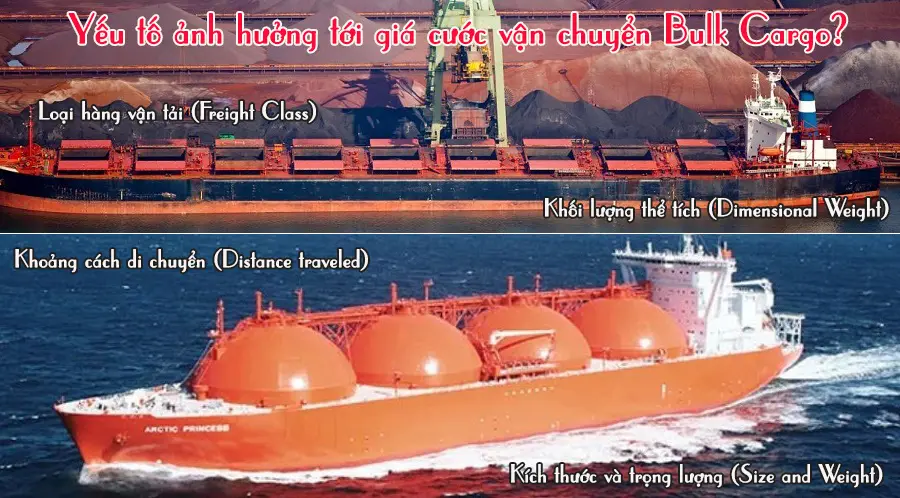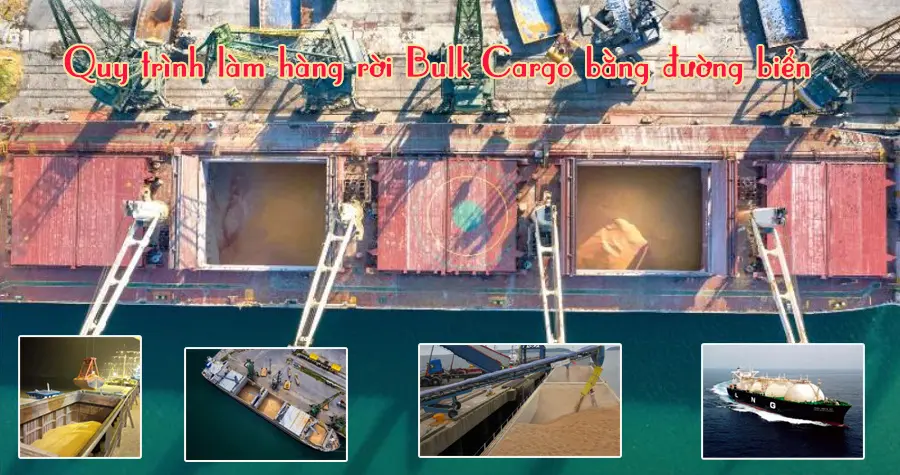X You are the owner, shipping businesses need to learn about many types of goods to facilitate the choice of ships, shipping lines, reputable shipping, ... and one of the questions is the goods, Bulk Cargo cargo ships?
X You want to learn deeply about classification, characteristics of Bulk Cargo cargo?
X You want to know what factors affecting Bulk Cargo freight rates? How is the process of making Bulk Cargo sea?
Let Proship.vn find out what Bulk Cargo is? What factors affect the freight of Bulk Cargo? What are the characteristics of Bulk Cargo cargo, how to classify it?
Bulk Cargo: Concept, classification and loading and unloading equipment
What is Bulk Cargo, how to classify and any equipment used for loading and unloading will be answered as follows:
Bulk Cargo concept
Bulk Cargo means loose goods. People use the terms of removable goods to refer to non -packaged goods but often contain directly in the compartment of vehicles, trains or ships. The way to transport loose goods is also called the carrier or the bucket (Carriage in Bulk).

Bulk Cargo classification
Bulk Cargo is divided into the following categories:
- Snake removable goods:
This type of removable goods exists in the form of solids. Snake removable goods are usually transported in large quantities such as stone, materials, particles, flour, agricultural products, ...
- Liquid loose type:
This type of removable goods exists in the form of liquid, solution such as water, petroleum, chemicals, etc.This type of cargo should be transported by specific specialized vehicles or needed in private tanks that do not affect the external environment.
- Bulk Cargo gas:
Gas such as liquefied gas (LNG), compressed natural gas (CNG), special gases such as oxygen and hydrogen gas are transported in gas form and often needed air vessels or special conversion systems.
Domestic and international container transportation services,
Loading and unloading equipment to leave Bulk Cargo
Some specialized equipment used in loading and unloading of Bulk Cargo such as:
- Lifting bridge: There is a special design for removable loading and unloading such as cotton, ores, sand from containers or ships;
- Emerbal shaft: With the ability to rotate and move flexibly, this device is used at seaports for loading and unloading goods;
- Cao village: Used as a goods holder, creating a flat surface to queue or lift goods;
- Forklift: Used to lift and move goods from one point to another (running on gasoline or electricity).
Factors affecting the freight rates of Bulk Cargo
What are the factors that affect the freight rates of Bulk Cargo? That is:
Bulk Cargo - Freight Class (Freight Class)
Regarding the characteristics and commercial value of the shipment, the degree of damage is prone to damage. The more easy to damage the product to control or have high value will have higher freight charges.
Bulk Cargo - size and weight (size and weight)
Size and weight are factors affecting the total shipping cost. These figures are essential for senders and carriers need to determine the tax rate related to a certain shipment and set shipping prices to calculate for customers.

Bulk Cargo - Dimensional weight.
Goods are converted from the volume of CM3 according to the formula:
Volume volume = volume/5000
Bulk Cargo - Distance Traveled
Although transportation distance is an important factor affecting shipping charges, the fee usually does not increase on the basis of each miles, but depending on the terminal cost of different transport methods.
What are the characteristics of the cargo ships from Bulk Cargo? What is different from the case (Break Bulk Cargo)?
What is the characteristics and differences between the Bulk Cargo and Bulk Cargo? Proship answered as follows:
Characteristics of cargo ships leave Bulk Cargo
The cargo ship left Bulk Cargo has the following characteristics:
- Bulk Cargo is a vessel with a huge capacity in transporting goods in the world;
- Bulk Cargo goods are stored directly into the shipproof cargo compartments of the ship;
- Bulk Cargo transports goods in the form of raw, dry (Bulk Cargo) such as coal, sulfur, iron ore, agricultural products, non -barreled scrap or packages;
- In addition, there are specialized trains. A deck, a solid structure. There are hips and tanks hanging on the sides of the cargo tunnel reducing the cargo tunnel surface and easy to adjust the center of the ship (when needed).
READ MORE: Get refrigerated Container shipping at good prices
The difference between the Bulk Cargo and the Bulk Cargo (Break Bulkgo)
Between the Bulk Cargo and the Bulk Cargo (Break Bulkgo), there are several differences in the packaging, transportation and application methods. Statistical details in the following comparison table:
|
Criteria |
Bulk Cargo |
Break Bulk Cargo |
|
Type of goods |
Unrelated goods (sand, coal, oil) |
Lacked goods packed (pallet, package, barrel) |
|
Transport method |
Pour directly into the train compartment |
Unloading individually by cranes |
|
Ships used |
Bulk Carrier, tanker |
Break Bulk Vessel, versatile ship |
|
Application |
Raw materials, large quantities |
Machinery, steel rolls, large equipment |
|
Expense |
Lower for large lots |
Higher for small lots |
|
For example |
Iron ore, crude oil, cereal |
Roll steel, wood, wind turbine |
The process of making bulk cargo by sea
The following is the process of making stages of leaving Bulk Cargo sea bulk that Proship has updated from many reliable logistics sources:
Phase 1
In the process of transporting goods over the sea, each ship needs 5-7 workers to ensure the work:
- 1 lift bridge operator;
- 1 person who operates the lifting equipment;
- 1 signal control;
- 2 people install and dismantle the cable;
- 2 people line up in the train compartment.
Phase 2
The removable loading and unloading process through the train tunnel will use the lifting equipment to open the tunnel door, move the cables and hook to the train yard area to get the goods. The workers install and dismantle the cable and attach hooks to the row and adjust the amount of goods to suit the lifting and weight of the crane.

Stage 3
After that, the crane is moved to raise the goods, with the safety test when lifting at an altitude of 2.5m. The workers control the signal of the shaft movement until the row left the mouth of the tunnel. There, workers lined up in the train compartment and started loading and unloading of goods.
In this process, workers need to comply with occupational safety regulations such as ensuring that the goods are taken regularly from the two sides, using appropriate lifting equipment and ensuring safety when working in the ship tunnel.
Above is the knowledge that helps clarify what Bulk Cargo is as well as classifying loose goods, separate goods characteristics, factors affecting the freight rates, ... Any questions, contact immediately 0909 344 247 for answers and advice on the North -South and International Sea Protection Services from the port - port, port - warehouse, warehouse - the best cheap warehouse only available at Proship Logistics.
